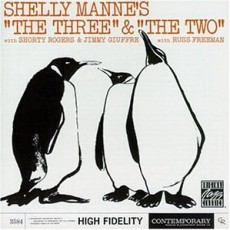
Daily Dose Of Jazz…
Shelly Manne was born Sheldon Manne in New York City on June 11, 1920. His father and uncles were drummers, he got tips from drummer Billy Gladstone as a teenager and soon he rapidly developed his style in the 52nd Street clubs in the late 30s and 40s. He got his first professional job with the Bobby Byrne Orchestra and was soon recording with Coleman Hawkins, Charlie Shavers, Don Byas, Duke Ellington, Johnny Hodges, Harry Carney and Rex Stewart.
Manne rose to stardom when he became part of the bands of Woody Herman and Stan Kenton in the late 1940s and early 1950s, winning awards and developing a following at a time when jazz was the most popular music in the United States. When the bebop movement began to change jazz in the 1940s, Manne loved it and adapted to the style rapidly, performing with Dizzy Gillespie, Charlie Parker, Flip Phillips, Charlie Ventura, Lennie Tristano and Lee Konitz.
In the early 1950s, Manne left New York, settled permanently on a ranch outside Los Angeles, where he and his wife raised horses. This began his important role in the West Coast school of jazz, performing on the Los Angeles jazz scene with Shorty Rogers, Hampton Hawes, Red Mitchell, Art Pepper, Russ Freeman, Frank Rossolino, Chet Baker, Leroy Vinnegar and many others.
Shelly led a number of small groups that recorded under his name and leadership, recording his now famous live Black Hawk sessions and for Contemporary Records. He played in styles of Dixieland, swing, bebop, avant-garde jazz and fusion, as well as contributing to the musical background of hundreds of Hollywood films and television programs, collaborating with Henry Mancini on such films as Breakfast At Tiffany’s, Hatari and The Pink Panther and tv shows like Peter Gunn and Mr. Lucky.
Shelly Manne passed away of a heart attack on September 26, 1984 shortly before the popular revival of interest in jazz had gained momentum.
More Posts: drums
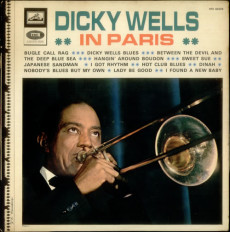
Daily Dose Of Jazz…
Dicky Wells was born William Wells on June 10, 1907 in Centerville, Tennessee but came to fame playing trombone as Dicky or Dickie Wells. He moved to New York City in 1926 and joined the band of Lloyd Scott.
He played two stints with Count Basie between 1938-1945 and 1947-1950. Dickie also played with Cecil Scott, Spike Hughes, Fletcher Henderson, Benny Carter, Teddy Hill, Jimmy Rushing, Buck Clayton and Ray Charles.
In his later years, Wells suffered a severe beating that affected his memory, but he recovered and continued to perform. He played frequently at the West End jazz club at 116th and Broadway, most often with a band called “The Countsmen”, led by alto saxophonist Earle Warren, his colleague from Count Basie days. His trademark was a “pepper pot” mute that he made himself.
Jazz trombonist Dickie Wells died on November 12, 1985, in New York City. Shortly after his death, his family donated his trombone to Rutgers University.
More Posts: trombone
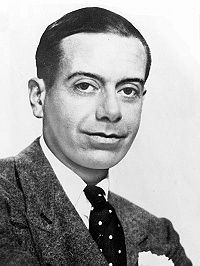
Daily Dose Of Jazz…
Cole Albert Porter was born into wealth on June 9, 1891 in Peru, Indiana. His musical training began at an early age, learning the violin at age six, the piano at eight and wrote his first operetta, with help from his mother at 10. His father, an amateur poet, may have influenced his son’s gifts for rhyme and meter. He matriculated through Yale writing student songs went on to Harvard law, switched to the music faculty, where he studied harmony and counterpoint.
Classically trained, he was drawn towards musical theatre. After a slow start, he began to achieve success in the 1920s, and by the 1930s he was one of the major songwriters for the Broadway musical stage. Unlike most successful Broadway composers, Porter wrote both the lyrics and the music for his songs.
After a serious horseback riding accident in 1937, Cole was left disabled and in constant pain, but he continued to work. His shows of the early 1940s did not contain the lasting hits of his best work of the 1920s and 30s, but in 1947 he made a triumphant comeback with his most successful musical, Kiss Me Kate.
Porter wrote numerous songs that have come to be jazz standards such as Night and Day, Anything Goes, I Get A Kick Out Of You and I’ve Got You Under My Skin, It’s De-Lovely, Begin the Beguine, Just One of Those Things and In The Still of the Night. He also composed scores for films from the 1930s to the 1950s.
Cole Porter, composer and lyricist, noted for his sophisticated, suggestive lyrics, clever rhymes and complex forms, contributed to the great American songbook, passed away of kidney failure on October 15, 1964.
More Posts: composer,songwriter
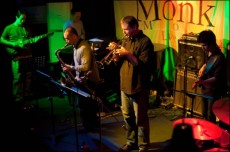
The Jazz Voyager
Club Monk: 53-34 DaeYeon 3 tong, Nam ku. Busan, South Korea. The club is located between Kyonseong Univ. & Pukeong Univ. across the street from the convenience store next to Ol’ 55 / Telephone: +82-(0)51-622-2212 Fax: +82-(0)51-312-5157 / Contact: JungRai Lee.
The 3rd oldest jazz club in Korea with a chilled atmosphere and offering several jazz styles – post bop, hard bop, fusion, etc. The club is open from 7:00pm- 2:00am with live performances from 9:00pm – 11:15pm Monday thru Saturday with no live music on Sundays. No food menu to speak of but offers several dishes, sausage, pork cutlet, fruit, etc. They have a music catalogue of more than 3000 jazz CDs.
Sponsored By
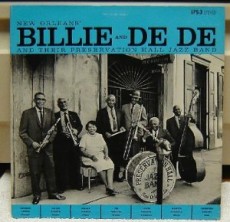
Daily Dose Of Jazz…
Billie Pierce was born Wilhelmina Goodson on June 8, 1907 in Marianna, Florida. She was born into a family of pianists with both parents and seven-sisters playing, notably her sister Ida Goodson.
Early in the 1920s, Billie played with Bessie Smith and later in the decade played in the bands of Alphonse Picou, Emile Barnes and George Lewis. By the 1930s she was playing the Blue Jay Club, where she met trumpeter De De Pierce; the two fell in love, married, and co-led their own ensemble, which served as the house band at Luthjen’s Dance Hall in the 1950s.
She played in the Preservation Hall Jazz Band and was a regular on the New Orleans jazz scene in the 1950s through the early Seventies. Pianist and singer Billie Goodson died on September 29, 1974 in New Orleans, Louisiana at the age of 67.
More Posts: vocal



